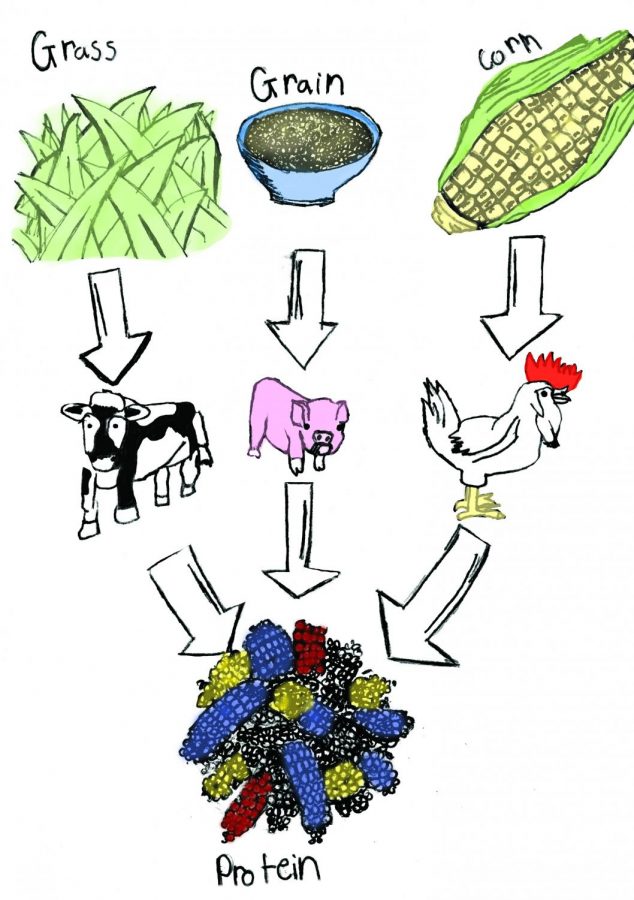Promoting environmental and human health awareness through veganism
Vegan (n.): a person who does not eat or use animal products
“Where do you get your protein?”
“Aren’t humans supposed to eat meat?”
The concept of not eating dairy, eggs, or meat is shocking to some. However, veganism has more benefits for the environment and the human body than what is widely known.
According to the Food and Agricultural Organization of the United Nations (FAO), livestock accounts for 14.5% of greenhouse gas emissions. This 14.5% includes animals such as cows, pigs, sheep, goats, and poultry.
Livestock produces powerful greenhouse gases: methane, nitrous oxide, and carbon dioxide through rumen gas and waste.
However, it is not the direct emissions from livestock that are the highest contributors of greenhouse gases within the agricultural realm; feed production and processing produce the most.
Massive amounts of grain fed to livestock, as well as killing the livestock, processing them, and transporting them, use massive amounts of energy. The fossil fuels necessary for these steps is that of eleven times more than it takes to produce protein from vegetable sources. This means that the meat industry emits considerably more harmful gasses than the vegetable industry.
“Our use of animals as a food production technology has brought us to the verge of catastrophe. The greenhouse gas footprint of animal agriculture rivals that of every car, truck, bus, ship, airplane, and rocket ship combined. There is no pathway to achieve the Paris climate objectives without a massive decrease in the scale of animal agriculture,” said the United Nations Environment Programme.
The FAO’s ideas for mitigation include better feed for livestock and feeding techniques, which could lead to a decrease in methane created during digestion and nitrous oxide, released by waste. Improving breeding and revamping animal health care could result in fewer and more productive herds.
KFC’s fake chicken burger and other popular veggie burgers like the Impossible Burger are made primarily of soy and potato protein. These are just a few of the ways that fast food companies are promoting plant-based diets.
A new documentary on veganism called “The Game Changers” highlights the benefits of veganism. Mainly that the proposition that plant-based eating decreases life-threatening impairments in the heart, such as high blood pressure and cholesterol, and improves athletic performance.
Where does the protein that vegans need come from?
As emphasized in “The Game Changers”, the animals that humans eat are just the middlemen for the protein needed to sustain a healthy life. The argument that vegetable protein compared to meat protein is inferior was proven false by new research in the film.
Protein is made up of strings of amino acids. Plants contain all the amino acids necessary for strength and muscle mass. As long as people consume the correct amount of amino acids, the source is irrelevant.
Forensic pathologist, Dr. Fabian Kanz, stated that Roman gladiators were predominantly vegetarian. Kanz and his team analyzed more than 5,000 bones through a study of skeletons uncovered in Ephesus, Turkey.
“We found in the cross-section of the bones, very high bone mineral density, which indicated intense training and high-quality diet to build up strong muscles and strong bones,” said Dr. Kanz.
The gladiators are nicknamed “hordearii,” meaning “beans and barley muncher.”
“One of the biggest misconceptions in sports nutrition is that we have to have animal protein in a particular meat to get big and strong and perform at a high level. That’s just clearly not true. All that protein that you get when you eat a steak or hamburger, where did it come from? It came from the plants that the cow ate,” said former team physician for the St. Louis Rams and Cardinals, Dr. James Loomis.
The world’s highest-performing athletes such as Olympians and record-holders all noticed a positive shift in their athletic performance when they switched to a plant-based diet.
Research in “The Game Changers” shows that a single hamburger impairs endothelial function, which regulates blood flow throughout the body. When restricted, it cannot allow increased blood flow, hindering athletic performance. That hamburger decreases endothelial function by 27% and increases inflammation by 70%.
Animal products also form plaques in the coronary arteries, as stated by Dr. Kim Wiliams, president of the American College of Cardiology. Plaque in the arteries can block blood flow, which causes life-threatening problems in the heart. This aids in the explanation that people who rely on their protein from solely plants have a reduced risk of heart disease by 55%.
Livestock experts Anne Mottet and Henning Steinfeld argue that plant-based eating excludes the 767 million people living in poverty: those who do not have the option to switch to veganism. Many impoverished people rely heavily on meat, milk, and eggs to address malnutrition.
In response to the need to change behaviors in light of the climate crisis, Mottet and Steinfeld said,“Wealthy consumers, in both high and low income countries, who are rightly concerned about their individual carbon footprint, have options like driving less or choosing low carbon food.”

Melissa Auchard, a senior, is in her second year of journalism. When she’s not training for track she likes to spend her time reading, baking, or surfing....

Aler Giffin is a senior at Archie Williams High School and has been a part of the journalism program for three and a half years now. In his free time he...









